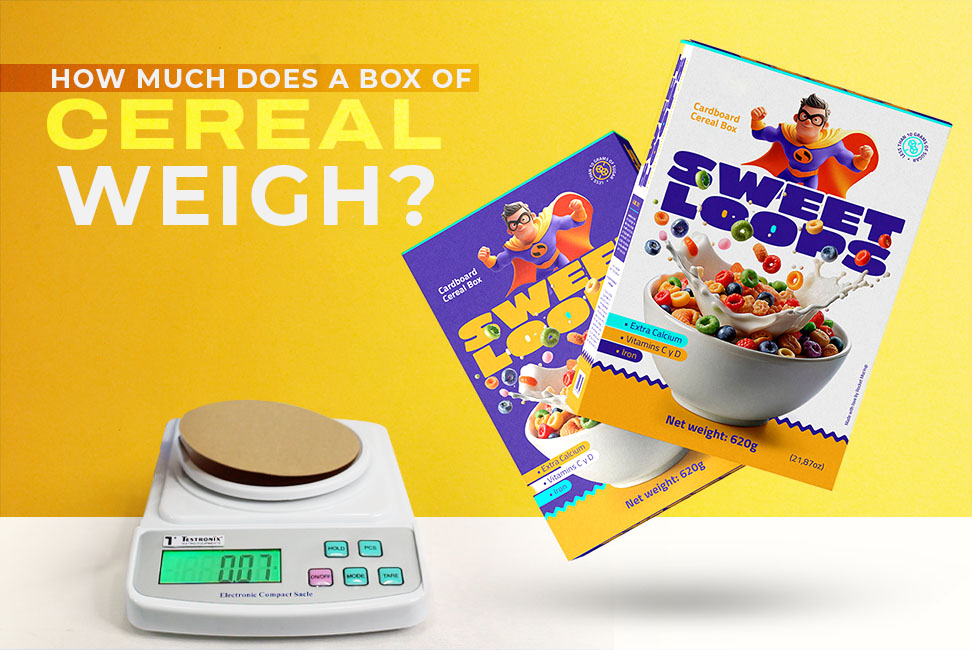- Home
-
By Industry
- Custom Retail Boxes
- Custom Cardboard Boxes
- Custom Cosmetic Boxes
- Custom Food Boxes
- Custom Gift Boxes
- Custom Display Boxes
- Custom Mailer Boxes
- Custom Paper Bags
- Custom Sports Boxes
- Custom Stationery Boxes
- Custom Bakery Boxes
- Custom Gable Boxes
- Custom Tuck Boxes
- Custom Pillow Boxes
- Custom Cupcake Boxes
- Custom Donut Boxes
- Custom Burger Boxes
- Custom Chocolate Boxes
- Box by Style
- Custom Packaging
- Our Products
- Request Quote
How much does a Box of Cereal Weigh?

A standard box of cereal weighs about 12 to 18 ounces (340 to 510 grams), depending on the brand and type of cereal. Including packaging, the total weight can vary on box size.
When you go down the cereal aisle at the store, you usually pick a box without thinking much about it. But have you ever stopped to wonder how much a box of cereal weighs? Whether you are tracking your food intake, custom cereal boxes, or designing packaging, understanding the average weight and dimensions can be surprisingly helpful. In this blog post, we will delve into everything you need to know about cereal box weight, size, and packaging. Let's get started.
Average Weight of a Box of Cereal in Ounces
The weight of a cereal box can vary depending on the brand, type of cereal, and size of the package. However, a standard cereal box weighs between 12 to 18 ounces (340g to 510g). This weight includes both the cereal and the packaging. For example:
- A small box may weigh around 8 to 10 ounces (225g–285g).
- A regular-sized box typically weighs 12 to 18 ounces (340g–510g).
- A family-sized box might weigh 20 to 24 ounces (570g–680g) or more.
Examples Weights by Brands
| Cereal Brand | Box Size | Net Weight |
| Kellogg’s Corn Flakes | Medium | 18 oz (510 g) |
| Cheerios (General Mills) | Large | 21 oz (595 g) |
| Froot Loops | Medium | 14.7 oz (416 g) |
| Special K | Small | 11.2 oz (317 g) |
Just keep in mind that net weight refers to just the cereals inside, not including the box. The box itself usually weighs about 1 to 1.5 ounces, depending on the thickness of the cardboard.
How Much Does a Box of Cereal Weigh in Pounds?
A standard box of cereal typically weighs between 0.75 to 1.25 pounds.
This includes both the cereal and its packaging (usually a paperboard box with an inner plastic bag).
Larger family-size boxes may weigh more, while smaller or single-serve options weigh less.
| Cereal Box Size | Weight (lbs) |
| Small (8 oz) | 0.5 lbs |
| Regular (12 oz) | 0.75 lbs |
| Large (18 oz) | 1.1–1.2 lbs |
| Family Size (24 oz+) | 1.5 lbs or more |
How Much Does a Box of Cereal Weigh in Grams?
In grams, a typical cereal box weighs between 340 and 510 grams, including packaging.
The weight depends on the type of cereal (flakes, granola, puffed, etc.) and the serving size.
Family-size or value packs can weigh up to 680 grams or more.
| Cereal Box Size | Weight (grams) |
| Small (8 oz) | ~227 g |
| Regular (12 oz) | ~340 g |
| Large (18 oz) | ~510 g |
| Family Size (24 oz+) | ~680 g or more |
Why Does Cereal Box Weight Matter?
You may not think cereal weight is essential. But it plays a key role in several everyday situations. Knowing factors that affect the total weight of a cereal box is necessary in several cases:
-
Shipping costs:
When you are shipping cereal boxes to stores or customers, the weight affects shipping charges. Lighter boxes are cheaper to transport, especially for online sellers.
-
Diet-tracking:
If you are keeping track of how much cereal you eat, the box weight can help you estimate the serving per box. For example, a 12-ounce box might contain 10 to 12 servings.
-
Retail and display planning:
Retailers need to know the weight of cereals to plan safe and efficient shelving. Heavier boxes may require sturdier shelves or lower placement to avoid tipping or damage. Weight also affects how easily products can be stocked or rotated.
-
Customization:
Brands often design custom cereal boxes for promotions, giveaways, or limited editions. The weight helps packaging companies choose the right materials, thickness, and structure.
What's Inside the Cereal Box?
Besides cereal, most boxes also contain a sealed plastic liner or bag to keep the product fresh. This liner adds minimal weight (usually under 0.5 ounces or 14 grams) but plays an essential role in preserving flavor and crunchiness.
Standard Dimensions of a Cereal Box
Besides weight, cereal box dimensions are also essential. Here are the standard sizes used in the market:
| Box Size | Height | Width | Depth |
| Small | 7.5 in (19 cm) | 5 in (13 cm) | 1.5 in (4 cm) |
| Medium | 12 in (30.5 cm) | 7.5 in (19 cm) | 2 in (5 cm) |
| Large | 13.5 in (34.5 cm) | 9 in (23 cm) | 2.5 in (6.5 cm) |
If you are looking to dive deeper into the dimensions of a cereal box this detailed guide is just for you.
Guide to Choose the Right Size for Your Brand
If you are in the business of selling cereals or creating your blend, choosing the correct box is essential. Here are some helpful tips:
Know your product weight:
At first, estimate the average weight of your cereal per batch. A light cereal may need more volume but less weight, while dense cereals may require compact but sturdy packaging.
Consider standard box sizes:
Most cereal brands use standard sizes, including small (8oz), medium (12oz), and family size (18oz) or more. Choosing a standard size makes your products more familiar and easier to stock for retailers.
Think about shelf presence:
Larger boxes stand out on shelves, but smaller ones are easier to store and ship. You must find the perfect balance between practicality and visibility.
Test shipping and storage:
Further, you can try mock shipping and stacking tests. A box that looks good but does not hold up in transit or on the shelf could hurt your brand recognition.
Customization counts:
Want to stand out? Go for a blank cereal box design that you can fully customize with your logo, nutritional facts, and vibrant graphics. But you must ensure that the box size still fits nicely on store shelves.
Match with your targeted audiences:
Kids' cereals may come in larger boxes with fun and bright artwork. Health-conscious cereals for adults often look better in small and simple boxes with clean designs.
Conclusion
The next time you grab your favorite cereal, you will know a little more about what's inside and what it weighs. So, how much does a cereal box weigh? A standard cereal box usually weighs around 12 to 18 ounces and measures about 12 x 7.5 x 2 inches. Whether you are a consumer, seller or product designer, this information can help you make better choices. If you are planning to create custom cereal boxes, iCustomBoxes is your go-to destination. Partner with us to get top-notch packaging solutions at competitive prices.
FREQUENTLY ASKED QUESTION
How much does the average box of cereal weigh?
The average cereal box typically weighs between 12 to 18 ounces (340 to 510 grams), including the packaging and contents. This weight varies depending on the cereal type and serving size.
How big is a 12 oz cereal box?
A 12 oz cereal box usually measures about 7.5 inches (19 cm) in height, 5 inches (13 cm) in width, and 2 inches (5 cm) in depth. Sizes can vary slightly based on brand and packaging design.
What is the weight of cereal box cardboard?
Cereal boxes are commonly made from paperboard weighing between 18 to 24 points (0.018 to 0.024 inches thick), which roughly corresponds to 200-350 grams per square meter (GSM). This provides durability while remaining lightweight.
Jeff parker is a seasoned packaging industry writer with over 6 years of experience specializing in innovative custom packaging solutions. Based in New York, Parker combines hands-on knowledge from his early career in printing technology with a deep understanding of packaging trends across sectors like cosmetics, food, tobacco, and retail. Passionate about helping businesses enhance their brand presence through effective packaging, he regularly shares insights on the latest industry innovations.
